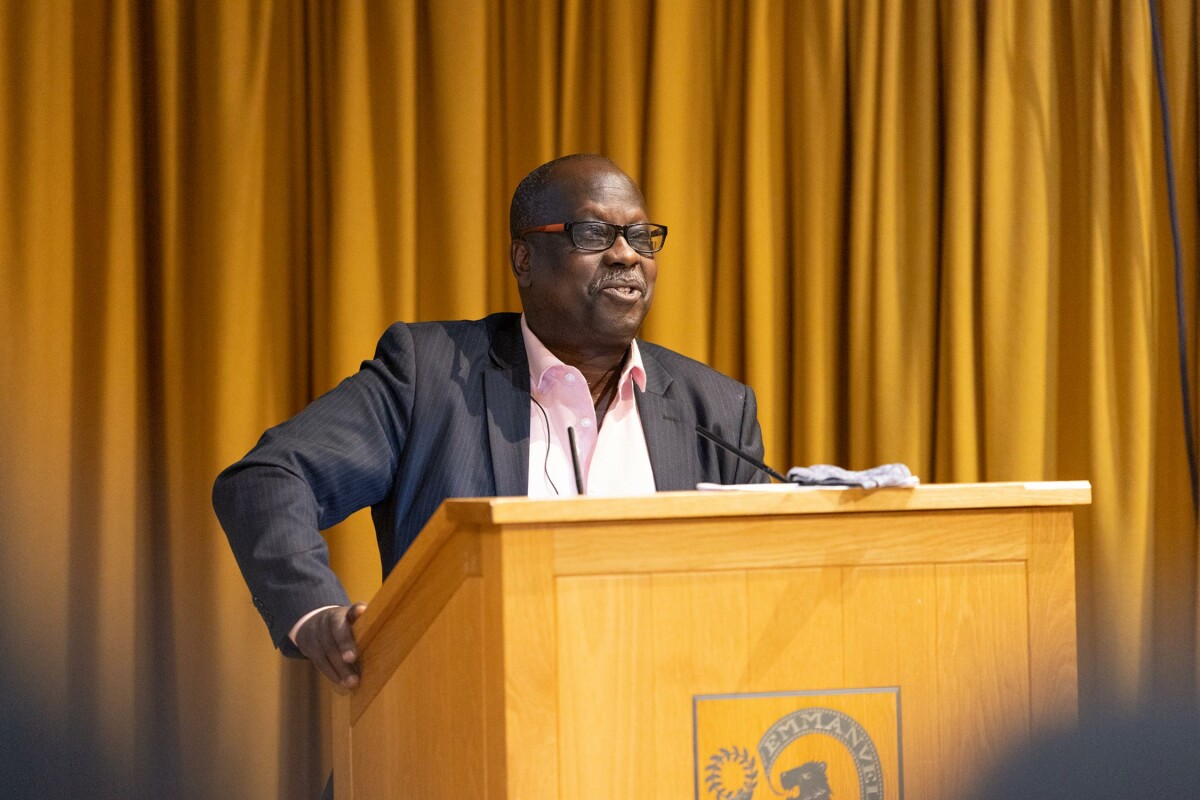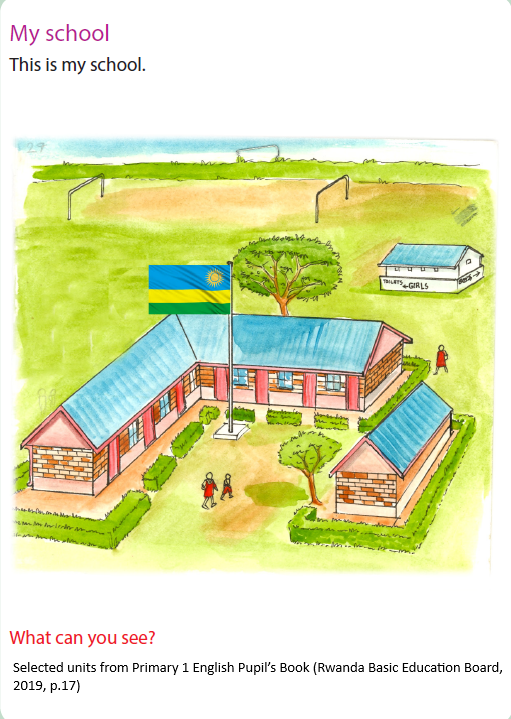Transitioning to an unfamiliar medium of instruction: pedagogical strategies used by Rwandan primary school teachers to enable learning

Written by Professor Eugene Ndabaga, University of Rwanda – College of Education
On the 6th of July 2022, I was invited to present the outcome of our research at the Cambridge-Africa Day. The event provides an opportunity to display the innovative and original aspect of the research that takes collaboratively between academics in Africa and in Cambridge. Particularly relevant is the move away from a deficit narrative in all the research which was presented.
Strong academics from Africa, for instance Professor Samba Sow, the Director of the Centre for Vaccine Development, Mali, and Professor Nelson Sewankambo, Professor Emeritus and a former Dean of Makerere University Medical School, Uganda, showcased a number of innovations which were taking place in the medical field. Dr Babalola and Dr Daraojimba presented ancient technological innovations which are directly traced to indigenous groups in Africa.
The rationale of our research also aligns very well with the narratives of the research presented, which focuses on the innovative aspect of pedagogical approaches used by Rwandan teachers who face linguistic challenges when delivering the content of their lessons.
In this blog, I reflect on the strategies used by teachers in classrooms as they aim to engage children with learning concepts outlined in the national curriculum, concepts such as “what does it mean to live in community”.
The project started in November 2019 and our aim was to investigate the classroom pedagogical strategies used by primary school teachers to support the transition from Kinyarwanda to English as language of instruction, which used to take place at the end of primary 3. Yet, within only a few months into the project our plans changed.

Not just schools were closed due to the COVID-19 pandemic, but also the Ministry of Education in Rwanda announced another policy shift in language of instruction. This time, the new policy stated that children would have to learn English from the start of primary school. This sudden policy shift meant that not just teachers in upper primary school had to adopt strategies for engaging with learning concepts in a language which is mostly unfamiliar to everyone in the classroom, but now all teachers in primary schools would face the same challenge. For this reason, we decided to engage with teachers in four public schools located in Kigali, Rwanda and we raised the following question: What pedagogical strategies are you using to support students learning in English as the medium of instruction?
While exploring the pedagogies that Rwandan primary school teachers employ to teach students, we commit to avoiding a deficit-driven lens on teachers. We also avoid criticising language policy. In other words, we move beyond blaming government or school actors and teachers for what is often referred to as the “learning crisis” or “learning poverty”. Instead, we acknowledge teachers’ proficiency and pedagogical skills in English as limitations in teaching, but not one that the teacher is incapable of overcoming. Particularly in the context of Rwanda, the teacher is also a mentor, an innovator, a communicator and a member of the community. Teachers are required to teach subject content, among the holistic competencies envisioned by the competence-based curriculum, and to serve as the rare source of input of English especially for students who rarely have opportunities to engage with English outside of the classroom.
Methodology:
Our key findings draw on in-depth qualitative data collected in four 12-year Basic Education (12YBE) schools in Kigali City across two districts: Gasabo and Kicukiro. These are government schools committed to an equitable provision of free and compulsory education for the majority. Most crucially, they are bound by, and in reality, following the national curriculum as well as the official policy of MOI accordingly. With the assistance from the respective headteacher and Dean of Studies, the teachers who taught the four core subjects at primary 1, 3 and 4 in were identified respectively.
Primary 3 and 4 were chosen as prior to the policy change in 2020, these were levels during which teachers prepared, and supported students in transition to English as language of instruction. Primary 1 was subsequently added as this reflected the most recent need for teachers to support students in transition after the policy change. In total, 24 teachers were selected for, and took part in interviews.
Key Findings:
- The most important strategies used by teachers deal with the need for communicating in an unfamiliar MOI. Most subject teachers shared that before covering the content of their sessions, they had to support the most basic English vocabulary for children. In order to move to content, teachers have to adopt strategies for effective communication, which include the use of Kinyarwanda through code-switching and translation. Some teachers also emphasized that simple words were preferred to meet student level. As students were still developing language proficiency in English, teachers also had to constantly repeat new words and concepts to support students with memorization. Lastly as students were new to English orthography, a few teachers also emphasized the importance of copying notes for students to practice writing.
- Teachers also recognized the use of visual demonstration to help students acquire more vocabulary and understand subject content. These were preferred especially when pedagogical materials remained scarce. Example of visual demonstration encompass the use of objects, drawing, and use of facial gestures, which are utilised by teachers to help to communicate the content of the lesson.
- Strategies to keep students engaged during lesson was also highlighted by teachers. Teachers acknowledge that when children do not understand the lesson it is very difficult to keep them motivated. For this reason, teachers emphasise the use of songs, playing games, role play and group work. In the view of teachers, these activities keep students interested in the subject. Homework exercise was also used by most teachers regularly to motivate students beyond lesson time, while strengthening the understanding of content.
- Importantly, teachers acknowledged that language barriers imply the need to start from the simplest concepts and then build to more complex understanding of the concepts. This was illustrated in terms of children’s understanding of the community. “Of course children understand the community, they live in our communities”. But they do not understand the vocabulary to describe all the different members of the community. So, teachers have to start from the most basic repetitions so that children know the vocabulary, and then build on more complex questions, for instance: why is Umuganda[1] important for Rwandan sense of community? Who participate in Umuganda? Why do we participate? What are the benefits of Umuganda?
Conclusions
The work of the teacher is complex. Teachers in Rwanda are committed to support our learners. Our teachers have adopted strategies for communication, used visual illustrations, maintain learners interested in the topic, but at the same time rely in rote learning and memorisation, primarily to overcome the language barrier. The quote from one teacher exemplifies the innovative nature of their pedagogical approaches:
“You might tell like one learner in P.3 in English there’s a topic about animals, and under it is a sub topic that says listen and guess, you as teacher you raise up a voice of a certain animal, and you ask them which animal am I? then they say it out because of those gestures. Or you walk on four legs.”
What our children see in these teachers is not just a person who is delivering content, but someone who is innovating so that children can make a connection between the English word for “dog” or Imbwa in Kinyarwanda. and “i”. Of course our children know what “Imbwa ” is, they just do not know that in English our “Imbwa ” means dog. So, in order to overcome these challenges, we found teachers innovating beyond communication. They understand the need to motivate children but at the same time support them as they will face future transitions and examinations. It is this tension that is at the heart of the work of the teachers, and one which we should continue to support with evidence so that teachers are more confident that their work does indeed support learning.
Acknowledgements: I want to thank Cambridge Africa Alborada Fund for providing the financial support for this research. Special thanks to my collaborators Dr Kwok and Professor Sabates as well as my research support team Sylvesytre Ntabajyana and Barthelemy Bizimana.
-------------------------------------------------------------------------------------------------------------------------
[1] Umuganda means “coming together in common purpose to achieve an outcome”. It intends to strengthen communal relations and associations within villages.

